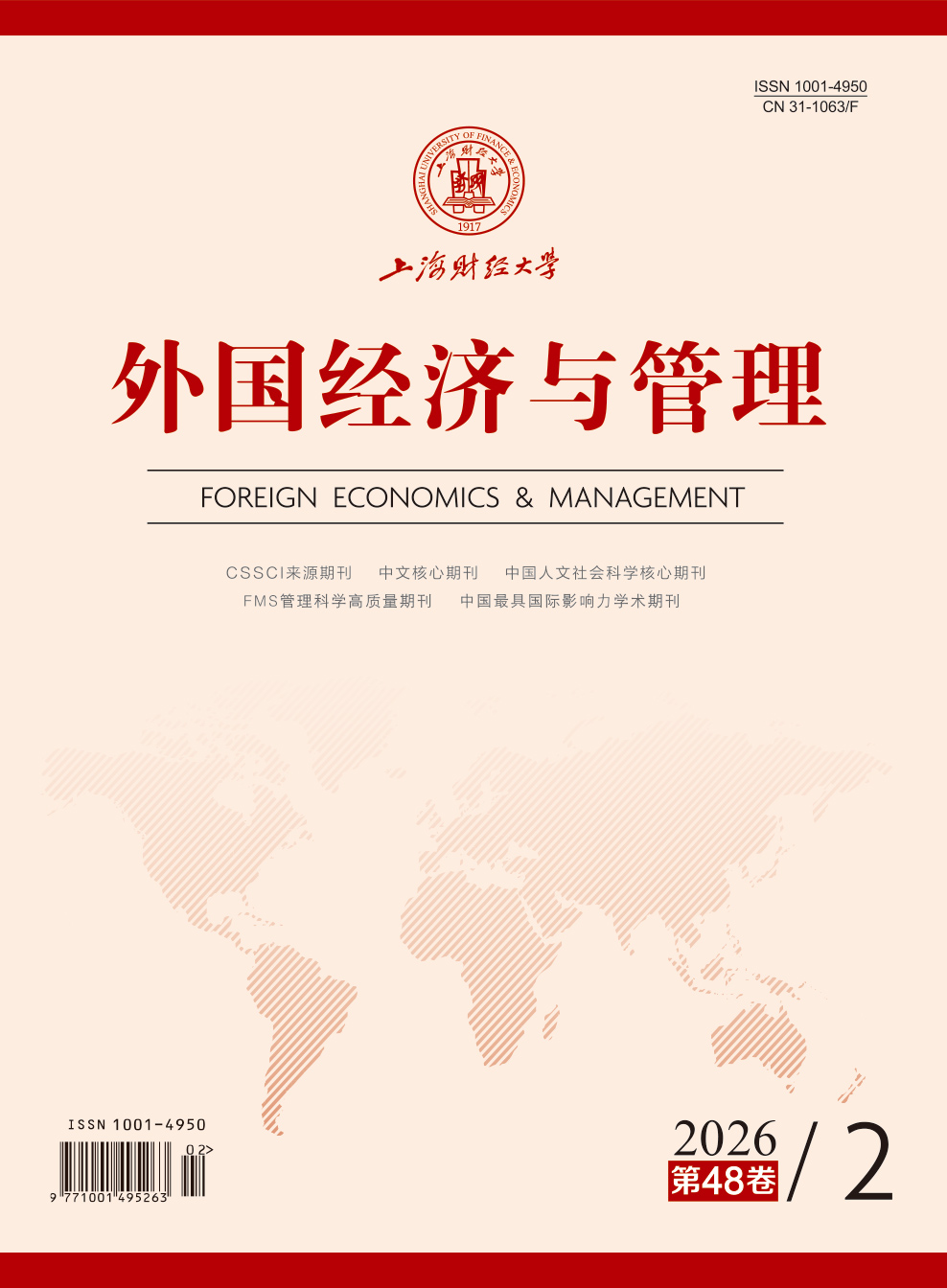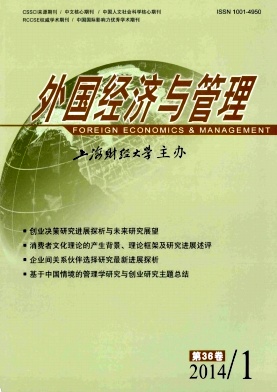基于中国情境的管理学研究与创业研究主题总结
外国经济与管理 2014 年 第 36 卷第 01 期, 页码:65 - 72
摘要
参考文献
摘要
中国情境下的管理研究引起了国际主流管理学期刊的持续关注,并逐渐成为全球管理理论新知识的重要源泉。然而,目前学者们对于中国情境的挖掘尚不尽如人意。围绕情境如何对理论研究产生贡献,如何从特殊的中国情境中提炼科学问题,基于中国情境的创业研究有哪些值得关注的主题等问题,一些国内、外知名学者在由南开大学商学院主办,《外国经济与管理》作为媒体支持单位的"全球化背景下的创业研究:理论和实证进展"国际学术研讨会上进行了广泛的讨论。本文结合相关文献对该议题进行了梳理,希望能够带给从事创业研究的学者些许启发。
[1]Atuahene-Gima K and Li H.When does trust matter?Antecedents and contingent effects of supervisee trust on performance on selling new products in China and United States[J].Journal of Marketing,2002,66(3):61-81.
[2]Audretsch D B and Keilbach M.The theory of knowledge spillover entrepreneurship[J].Journal of Management Studies,2007,44(7):1242-1254.
[3]Barney J B and Zhang S.The future of Chinese management research:A theory of Chinese management versus a Chinese theory of management[J].Management and Organization Review,2009,5(1):15-28.
[4]Boisot M and Child J.From fiefs to clans and network capitalism:Explaining China’s emerging economic order[J].Administrative Science Quarterly,1996,41(4):600-628.
[5]Jia L,et al.Chinese context and theoretical contributions to management and organization research:A three-decade review[J].Management and Organization Review,2012,8(1):173-209.
[6]Li H and Zhang Y.The role of managements’political networking and functional experience in new venture performance:Evidence from China’s transition economy[J].Strategic Management Journal,2007,28(8):791-804.
[7]Li H,et al.Returnees versus locals:Who perform better in China’s technology entrepreneurship?[J].Strategic Entrepreneurship Journal,2012,6(3):257-272.
[8]Peng M W.Institutional transitions and strategic choices[J].Academy of Management Review,2003,28(2):275-296.
[9]Polanyi M.The tacit dimension[M].Garden City,New York:Anchor Books,1967:217.
[10]Shane S.Prior knowledge and the discovery of entrepreneurial opportunities[J].Organization science,2000,11(4):448-469.
[11]Smith P.Chinese management theories:Indigenous insights or lessons for the winder world?[A].Huang X and Bond M H(Eds.).The handbook of Chinese organizational behavior:Integrating theory,research and practice[C].Cheltenham:Edward Elgar,2011.
[12]Tsui A,et al.Guanxi in the Chinese context[A].Li J T,et al(Eds.).Management and organization in the Chinese context[C].London:Macmillan,2000.
[13]Tsui A S,et al..Organization and management in the midst of societal transformation:The People’s Republic of China[J].Organization Science,2004,15(2):133-144.
[14]Tsui A S.Contributing to global management knowledge:A case for high quality indigenous research[J].Asia Pacific Journal of Management,2004,21(4):491-513.
[15]Tsui A S,et al.Cross-national,cross-cultural organizational behavior research:Advances,gaps,and recommendations[J].Journal of Management,2007,33(3):426-478.
[16]Von Glinow M A and Teagarden M B.The future of Chinese management research:Rigor and relevance redux[J].Management and Orgnization Review,2009,5(1):75-89.
[17]Zahara S A and Wright M.Entrepreneurship’s next act[J].Academy of Management Perspective,2011,25(4):67-83.
[18]Zhang Y and Li H.Innovation search of new venture in a technology cluster:The roles of ties with service intermediaries[J].Strategic Management,2010,31(1):88-109.
[19]张玉利,杨俊,戴燕丽.中国情境下的创业研究现状与未来研究建议[J].外国经济与管理,2012,(1):1-9,56.
[2]Audretsch D B and Keilbach M.The theory of knowledge spillover entrepreneurship[J].Journal of Management Studies,2007,44(7):1242-1254.
[3]Barney J B and Zhang S.The future of Chinese management research:A theory of Chinese management versus a Chinese theory of management[J].Management and Organization Review,2009,5(1):15-28.
[4]Boisot M and Child J.From fiefs to clans and network capitalism:Explaining China’s emerging economic order[J].Administrative Science Quarterly,1996,41(4):600-628.
[5]Jia L,et al.Chinese context and theoretical contributions to management and organization research:A three-decade review[J].Management and Organization Review,2012,8(1):173-209.
[6]Li H and Zhang Y.The role of managements’political networking and functional experience in new venture performance:Evidence from China’s transition economy[J].Strategic Management Journal,2007,28(8):791-804.
[7]Li H,et al.Returnees versus locals:Who perform better in China’s technology entrepreneurship?[J].Strategic Entrepreneurship Journal,2012,6(3):257-272.
[8]Peng M W.Institutional transitions and strategic choices[J].Academy of Management Review,2003,28(2):275-296.
[9]Polanyi M.The tacit dimension[M].Garden City,New York:Anchor Books,1967:217.
[10]Shane S.Prior knowledge and the discovery of entrepreneurial opportunities[J].Organization science,2000,11(4):448-469.
[11]Smith P.Chinese management theories:Indigenous insights or lessons for the winder world?[A].Huang X and Bond M H(Eds.).The handbook of Chinese organizational behavior:Integrating theory,research and practice[C].Cheltenham:Edward Elgar,2011.
[12]Tsui A,et al.Guanxi in the Chinese context[A].Li J T,et al(Eds.).Management and organization in the Chinese context[C].London:Macmillan,2000.
[13]Tsui A S,et al..Organization and management in the midst of societal transformation:The People’s Republic of China[J].Organization Science,2004,15(2):133-144.
[14]Tsui A S.Contributing to global management knowledge:A case for high quality indigenous research[J].Asia Pacific Journal of Management,2004,21(4):491-513.
[15]Tsui A S,et al.Cross-national,cross-cultural organizational behavior research:Advances,gaps,and recommendations[J].Journal of Management,2007,33(3):426-478.
[16]Von Glinow M A and Teagarden M B.The future of Chinese management research:Rigor and relevance redux[J].Management and Orgnization Review,2009,5(1):75-89.
[17]Zahara S A and Wright M.Entrepreneurship’s next act[J].Academy of Management Perspective,2011,25(4):67-83.
[18]Zhang Y and Li H.Innovation search of new venture in a technology cluster:The roles of ties with service intermediaries[J].Strategic Management,2010,31(1):88-109.
[19]张玉利,杨俊,戴燕丽.中国情境下的创业研究现状与未来研究建议[J].外国经济与管理,2012,(1):1-9,56.
引用本文
张玉利, 曲阳, 云乐鑫. 基于中国情境的管理学研究与创业研究主题总结[J]. 外国经济与管理, 2014, 36(1): 65–72.
导出参考文献,格式为:
下一篇:创业研究在中国:回顾与展望





 7682
7682  394
394

